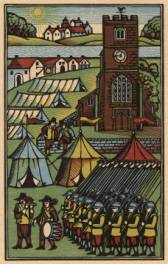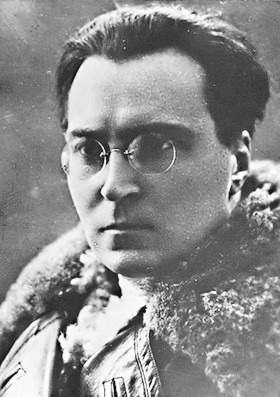history
Australia: Red councillors during the Cold War: Communists on Sydney City Council, 1953-59

Sydney Town Hall in the 1950s.
Tom Keneally's `The People's Train': Steaming along the tracks of revolution

The People's Train
By Tom Keneally,
Vintage Books, 2009
Review by Phil Shannon
October 10, 2009 -- When Artem Samsurov first came to Brisbane in 1911, the Russian exile noted that the poor did not eat horse meat like they did in his native country and he wondered whether this did indeed make it true that Australia was a “working man’s paradise”? A diet that was no stranger, however, to rabbit, and bread and lard, suggested otherwise.
Tom Keneally’s latest novel, The People’s Train, follows the political and romantic adventures of Samsurov, a fictional character closely based on Fedor (``Artem'') Sergeyev, a Bolshevik who escaped from exile in Siberia after the crushing of the 1905 revolution in Russia and who was a political activist in Brisbane for six years. [See the Australian Dictionary of Biography's entry for Fedor``Artem'' Sergeyev below this review.]
In regular trouble with the Red-persecuting Queensland police, Sergeyev returned to Russia in 1917 in time to be elected to the central committee of the Bolshevik Party and play a leading role in the Russian Revolution.
Science and empire in the Pacific

Mai (aka Omai), the first Pacific Islander to visit Europe, with Joseph Banks in 1774. Painting by William Parry.
By Barry Healy
More than 240 years ago, on April 13, 1769, the peace of Tahiti was interrupted by the visit of Captain James Cook, supposedly observing the transit of Venus across the Sun, but really following secret orders to investigate the Pacific Ocean and its islands for the benefit of British colonialism.
Mainstream Australian history raises James Cook to a pinnacle because he established a white, British dominion on the Australian continent. However, at the time his fame was eclipsed because on board his ship was gentleman scientist Joseph Banks with a posse of staff.
Banks’ star outshone Cook’s because his work acquired the botanical treasures of Oceania for the British Empire, paving the way for Britain to dominate vital areas of science for its own benefit.
The Levellers and the 1640s English Revolution

By Graham Milner
In 1649, 360 years ago this year, an experiment in communal land holding and cultivation began on St. George's Hill in Surrey, England, as the principles of a communist society were put into practice by the Diggers -- followers of Gerrard Winstanley, a visionary and writer of radical political tracts. This experiment marked an important phase in the development of socialist tendencies in the struggle to defeat the Stuart monarchy in the 1640s. This essay attempts to analyse the dynamics of the revolutionary struggle in England during the 1640s civil war and its aftermath. It concentrates on the emergence and development of left-wing tendencies in the revolutionary movement, and attempts to provide an explanation for the defeat of the aspirations of those tendencies.
People's Republic of China at 60: Maoism and popular power, 1949–1969

Youth demonstrate during the Cultural Revolution.
[Click HERE for more analysis of the Chinese Revolution and its evolution.]
By Pierre Rousset
With the proclamation of the People’s Republic of China on October 1, 1949, the Chinese Communist Party (CCP) found itself at the head of a country three times larger than Western Europe, with a population of some 500 million. The internal situation was favourable to the revolutionary regime. At the end of a long series of civil and foreign wars, the population sought and relied on the new leaders to achieve peace while the ongoing people’s mobilisation opened the way for a deep reform of society.
People's Republic of China at 60: 1925–1949 -- Origins of the Chinese revolution

The rise and fall of the Communist Party of Thailand
September 9, 2009 -- ESSF -- The communist movement was first established in Siam (renamed Thailand in 1939) mostly in the Chinese ethnic migrant communities, then proliferated in the seemingly disparate surrounding regions in the north, northeast and south of the country. Following a long, difficult period of transition, the Communist Party of Thailand (CPT), once an urban party, retreated to the jungle and engaged in armed struggle. Its national expansion, during the 1970s, occurred while the kingdom was transformed into a US base for military intervention in the Vietnam War. The party eventually saw its decline during the Sino-Indochinese conflict of 1978–9 and disappeared from sight in the mid-1980s.
How US warmongers exploited the 9/11 terrorist attacks

By Norm Dixon
[This article was first published on September 11, 2002, on the first anniversary of the September 11, 2001, terrorist attacks in New York and Washington. Its observations remain relevant to this day.]
* * *
In the week before the first anniversary of the devastating September 11, 2001, terrorist attacks in New York and Washington, TV networks aired a seemingly never-ending string of ``special events'' featuring ``exclusive'' or ``never before seen'' footage of the collapse of the twin towers of the World Trade Center (WTC) and its aftermath. People around the world again experienced the horror, anger and tragedy of that terrible day, when almost 3000 working people were murdered.
Culminating on the anniversary of the day itself, thousands of journalists and TV presenters from across the globe will converge at ``ground zero'' in New York for ``remembrance and reflection''. Solemn ceremonies will be telecast and patriotic speeches by top US politicians broadcast, restating Washington's determination to pursue its ``war on terrorism''.
Victor Serge: `dishonest authoritarian', `anti-worker anarchist' or revolutionary Bolshevik?

[The following exchanges were first published in the US socialist magazine Against the Current. They have been posted at Links International Journal of Socialist Renewal with permission. Susan Weissman is the author of Victor Serge: The Course is set on Hope and editor of The Ideas of Victor Serge and Victor Serge: Russia Twenty Years After. She is a member of the editorial boards of Against the Current and Critique. The first essay is adapted from a section of a paper she delivered at a July 2008 conference on Trotsky’s legacy and first appeared in Against the Current, issue 136, September-October 2008. Following that is a response from Ernie Haberkern and reply by Susan Weissman. Some of Victor Serge's writings are available at the Marxists Internet Archive and at Resistance Books.]
By Susan Weissman
